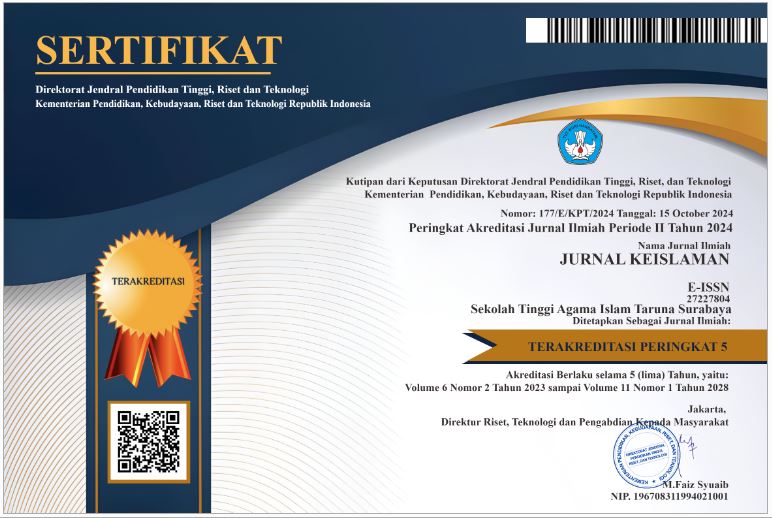Implementasi Pendidikan Karakter Berbasis Nilai-nilai Sosio-kultural di Madrasah Aliyah
DOI:
https://doi.org/10.54298/jk.v7i2.246Keywords:
Character building, Socio-cultural, MadrasahAbstract
This study is based on the importance of implementing character education values in madrasas, which in fact are educational institutions under the auspices of Islamic boarding schools. MA Bustanul 'Ulum under the auspices of the Bustanul 'Ulum Development Islamic Boarding School Education Foundation (YPPPBU) Central Lampung is one of the Islamic educational institutions that has long implemented character education. This qualitative research aims to determine and analyze character education management using a socio-cultural values approach at MA Bustanul 'Ulum Jayasakti, Central Lampung. This research uses a qualitative research approach by taking research informants from foundation leaders, madrasa leaders, and five teachers' councils. Through in-depth interview techniques, observation, and documentation, data was collected from informants which was then analyzed through the stages of data reduction, data presentation, and drawing conclusions. To ensure the validity of the data, researchers used data triangulation. In the end, this research found the fact that the internalization of character education values at MA Bustanul 'Ulum was carried out through a planning, implementation and evaluation process with certain steps. The planning involved the entire madrasah and Islamic boarding school management team, considering that this madrasah is a madrasah within the scope of Islamic boarding schools. With careful planning and determining the person in charge of the education program, the implementation of character education is carried out well through intracurricular and extracurricular learning activities that are integrated with Islamic boarding schools. The research results have implications for the importance of strengthening digital literacy in order to strengthen the values of character education.
Downloads
References
Abdurrahman, Nana Herdiana. “Character Education in Islamic Boarding School-Based SMA Amanah.” Jurnal Pendidikan Islam 2, no. 2 (2016): 287–305. doi:10.15575/jpi.v2i2.791.
Abdussamad, H Zuchri, and M Si Sik. Metode Penelitian Kualitatif. CV. Syakir Media Press, 2021.
Assa’idi, Sa’dullah. “The Growth of Pesantren in Indonesia as the Islamic Venue and Social Class Status of Santri.” Eurasian Journal of Educational Research 93 (2021): 425–40.
Atqia, Muhamad Reza, and Iwan Sopwandin. “Manajemen Pendidikan Karakter Pondok Pesantren Baitul Hikmah Haurkuning Tasikmalaya.” Tadbir Muwahhid 6, no. 2 (2022): 125–43. doi:10.30997/jtm.v6i2.6225.
Azungah, Theophilus. “Challenges in Accessing Research Sites in Ghana: A Research Note.” Qualitative Research in Organizations and Management: An International Journal 14, no. 4 (2019): 410–27. doi:10.1108/QROM-07-2018-1671.
Baharun, Hasan. “Total Moral Quality: A New Approach for Character Education in Pesantren.” Ulumuna 21, no. 1 (2017): 57–80. doi:10.20414/ujis.v21i1.1167.
Balaram Naik, P Karunakar, 1 M Jayadev, 1 and V Rahul Marshal2. “Persepsi Masyarakat Tentang Penyebab Konflik Antara Desa Kesumadadi Dengan Desa Buyut Udik Lampung.” J Conserv Dent. 2013 16, no. 4 (2013): 2013.
Cooley, Aaron. “Qualitative Research in Education: The Origins, Debates, and Politics of Creating Knowledge.” Educational Studies 49, no. 3 (2013): 247–62. doi:10.1080/00131946.2013.783834.
Creswell, John W, and Cheryl N Poth. Qualitative Inquiry and Research Design: Choosing among Five Approaches. Sage publications, 2016.
Davidson, Matthew, Thomas Lickona, and Vladimir Khmelkov. “Smart & Good Schools: A New Paradigm for High School Character Education.” Handbook of Moral and Character Education 2008 (2008).
Fahham, Achmad Muchaddam. “Pendidikan Karakter Di Pesantren.” Aspirasi: Jurnal Masalah-Masalah Sosial 4, no. 1 (2013): 29–45.
Fauzi, Irzhal, and Rofiatu Hosna. “The Urgency of Education in Islamic Boarding Schools in Improving The Quality of Islamic-Based Character Education.” Al-Tadzkiyyah: Jurnal Pendidikan Islam 13, no. 1 (2022): 63–76. doi:10.1080/10357823.2016.1229266.
Gazali, Munawir, and Made Ayu Pransisca. “Pentingnya Penguasaan Literasi Teknologi Informasi Dan Komunikasi Bagi Guru Madrasah Ibtidaiyah Dalam Menyiapkan Siswa Menghadapi Revolusi Industry 4.0.” Jurnal Ilmiah Global Education 2, no. 1 (2021): 87–95.
Hefner, Claire-Marie. “Models of Achievement: Muslim Girls and Religious Authority in a Modernist Islamic Boarding School in Indonesia.” Asian Studies Review 40, no. 4 (2016): 564–82. doi:10.1080/10357823.2016.1229266.
Izfanna, Duna, and Nik Ahmad Hisyam. “A Comprehensive Approach in Developing Akhlaq: A Case Study on the Implementation of Character Education at Pondok Pesantren Darunnajah.” Multicultural Education & Technology Journal 6, no. 2 (2012): 77–86.
Mediawati, Desi. “Konflik Antar Etnis Dan Upaya Penyelesaian Hukumnya.” Khazanah Hukum 1, no. 1 (2019): 36–49. doi:10.15575/kh.v1i1.7134.
Mustofa, Imam. “Peran Organisasi Masyarakat Dalam Membangun Harmoni Pasca Konflik Antara Masyarakat Pribumi Dengan Masyarakat Pendatang Di Lampung Tengah.” Penamas 31, no. 1 (2018): 205–26. doi:10.31330/penamas.v31i1.150.
Ramah, Sutri, and Miftahur Rohman. “Analisis Kebijakan Implementasi Kurikulum Merdeka Di Madrasah.” Bustanul Ulum Journal of Islamic Education 1, no. 1 (2023): 97–114. doi:10.62448/bujie.v1i1.23.
Rohman, Miftahur, and Mukhibat Akmansyah, Muhammad. “Mainstreaming Strategies of Religious Moderation in Madrasah.” Al-Tahrir: Jurnal Pemikiran Islam 22, no. 1 (2022). doi:10.21154/altahrir.v22i1.3806.
Rohman, Miftahur, and Zulkipli Lessy. “Practicing Multicultural Education through Religiously Affiliated Schools and Its Implications for Social Change.” Jurnal Pendidikan Islam 6, no. 1 (2017): 1–24. doi:10.14421/jpi.2017.61.1-24.
Ulum, Bachrul, and Riswadi Riswadi. “Exploring The Role Of Teachers In The Development Of Hidden Curriculum Based On Islamic Boarding Schools.” AL-WIJDÃN Journal of Islamic Education Studies 8, no. 2 (2023): 261–79. doi:10.58788/alwijdn.v8i2.2357.
Downloads
Published
How to Cite
Issue
Section
License
Copyright (c) 2024 Miftahur Rohman, Nabilla, Ade Imelda Frimayanti

This work is licensed under a Creative Commons Attribution-ShareAlike 4.0 International License.
Authors who publish with this journal agree to the following terms:
- Authors retain copyright and grant the journal right of first publication with the work simultaneously licensed under a Creative Commons Attribution-ShareAlike 4.0 that allows others to share the work with an acknowledgement of the work's authorship and initial publication in this journal.
- Authors are able to enter into separate, additional contractual arrangements for the non-exclusive distribution of the journal's published version of the work (e.g., post it to an institutional repository or publish it in a book), with an acknowledgement of its initial publication in this journal.
- Authors are permitted and encouraged to post their work online (e.g., in institutional repositories or on their website) prior to and during the submission process, as it can lead to productive exchanges, as well as earlier and greater citation of published work (See The Effect of Open Access).


















